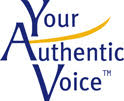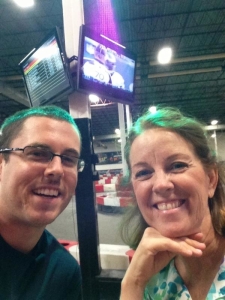You’ve seen them. Those folks who seem to be so comfortable speaking on stage, in meetings, and in social events.
You find them credible, believable and trustworthy. They can communicate their visions so others follow willingly, providing the information, knowledge and wisdom needed to fulfill those visions.
They do it authentically, and when they are really good at it, make it enjoyable. They are easily enthusiastic and invite their teams to come along for a great ride. As a result, others see how valuable they are to the organization. They do themselves proud and reap the benefits personally and by making a significant difference for others.
Sounds wonderful, doesn’t it? But, for many folks, this isn’t the case. Every week I receive calls from individuals who are facing the fear of speaking up at work. If that’s you, you have a lot of company.
When I ask what these folks are afraid of, here are some of the common responses:
- If I don’t learn how to speak, I’m not going to get the promotion.
- I don’t know what to say when I’m caught off guard and that undermines my credibility.
- I’m not sure I’m really communicating what I mean to say and that’s not helping my project.
It’s been a long time since I worked in an office, but I do know that at some point in everyone’s career, being able to express your ideas clearly and persuasively is a key to moving forward, even and sometimes especially, for folks where technology or numbers play an important role. If you’re moving into a leadership role, guess what? Communication is critical.
Thing is, I think most of us know this at some level, or we learn of it fairly quickly. What happens depends on whether or not we take action, because if we don’t, we will surely get reminders to do so.
It can start with your boss telling you it would be great if you improved your communication skills. If that suggestion gets lost in the shuffle, the next tap on the shoulder could be missing an opportunity because you weren’t prepared. If that goes by without any action, the next wake-up call could be losing a promotion, or a client, or a job.
Personally, I think the reason we sometimes wait until these things happen is we resist change. We think, maybe it will just go away.
Why do we resist? One reason could be the fear of failure.
Our culture is not very sympathetic when we fail, which is so crazy, because we all do at some point. It’s one of the best teachers! We often learn more from what hasn’t gone the way we’d hoped, than when it does. Learning to fail, and fail fast, is an essential life skill. Still, when we think we’ve failed (notice the word “think”), we don’t want to tell anyone, that’s for sure. Even though that could be one of the most inspiring things we could do! And, failing in front of a group, or in public — whoa!
So, better just to pretend nothing’s happening. Better to try to avoid speaking if at all possible instead of face our fear.
I certainly have done this. I’ve experienced plenty of what someone else might call “failures.” I’ve called them that too, but they really weren’t. They were redirection. For many years, I wanted to create collaborative relationships with one or two organizations I could embed myself into. I’d done this in the past and really enjoyed it. But, try as I might, it wasn’t happening. Rather than look at it, I blamed myself, felt bad, and blamed others. You know the drill. Truth was, I was avoiding a fear. One of the reasons I wanted to do this was because it was easier, or so I thought, and I wouldn’t have to do sales. That’s a lot of work, and not a little scary! Finally, after resisting reality for a long time, I succumbed and invested in a coach to help me get better at sales. Actually, I invested in a couple of coaches. Guess what? It helped, a lot. I faced my fears and the results have been worth it.
1. Here’s what I learned: the fear was worse than the thing itself.
I understand that all that time I spent putting it off was necessary in the big scheme of things. In the smaller scheme of things, I wish I’d done it earlier. I could have saved myself a lot of distress and not a little money.
Now I enjoy sales, most of the time. It’s really about talking with folks and finding out how I can help them. The hardest part about sales is knowing you canhelp someone, and they agree wholeheartedly, and then they let themselves down by not moving forward. That’s disappointing. Understandable, but disappointing.
We give ourselves lots of reasons. I know I have! I don’t have time, I don’t want to spend the money, it’s too much work. Maybe it will go away (even if it hasn’t so far).
Most likely, we would be willing to do whatever it takes to face our fear if we just had a guarantee it would work.
I understand that! Who doesn’t want a guarantee? No one wants to start a process without certainty of success. Often, the only thing we can do is do our homework and make our decision based on what we know and believe. There is no magic pill. It’s a calculated risk.
2. Sometimes, taking no action is the greater risk.
Here’s what I’ve experienced and come to believe:
Wherever your next step takes you, nothing is wasted. You’re always better off. You always learn and it leads to your next step.
So, if we’re still not moving forward, possibly, quite possibly, we’re still unwilling to face our fear. And, if that’s the case, it’s time to really reflect on that. How is that helping?
When it comes to speaking, learning how to present yourself powerfully in meetings, at functions, and on the stage is one of the most important and ultimately enjoyable skills you can acquire.
3. Embrace the opportunity to grow.
Relish the chance to broaden your horizons by becoming a powerful advocate for your message — an irresistible force for your cause! It works and it’s fun!
And however good you are, there’s always more, isn’t there? At least for me, learning is an ongoing activity.
Expanding your speaking skills will drive your success because it will help establish you as a leader, and I don’t just mean “head honcho” type of leader, unless that’s your goal. I’m talking being a leader in your own life, however and wherever that shows up. It opens up a whole new level of ease and confidence in all areas of your life.
Recently, a client told me that prior to starting her speaking journey, she didn’t know what she didn’t know. She wasn’t afraid to speak. She just had no idea the difference it would make in her ability to instill confidence and inspire others to act. Now she sees it as absolutely essential to her success. Over time, with continued focus, she now experiences how effortless it is. She can rock it with very little preparation because she has the skill and confidence to bring it. You go, girl!
Perhaps you can tell this is something I’m passionate about. That’s because it’s made such a huge difference in my life, and in the lives of others I know.
What’s the point in learning how to speak if you’re never on stage? My two cents — it’s about having the freedom to be the best you can be and sharing your outrageous, beautiful, powerful self fully with others!
I’d love to support you. You can reach me atAndrea@AndreaBeaulieu.com.



Leave A Comment